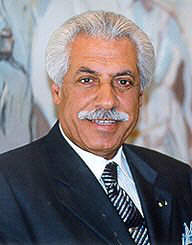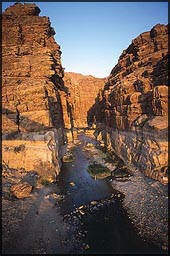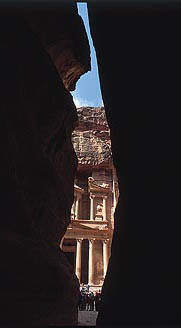 A BOOMING TOURISM INFRASTRUCTURE A BOOMING TOURISM INFRASTRUCTURE |
Tourism is Jordan's second largest industry, contributing to 12 per cent of GDP. Every year millions of travellers come to swim in the Dead Sea, visit archaeological monuments, see ancient biblical sites, camp in the desert and experience the local Bedouin culture.

"Tourism is the propeller of the national economy" confirms the Minister of Tourism, Aqel Beltaji. The Minister's mission statement, "Economic prosperity through sustainable tourism development" outlines a plan to develop a strong tourism infrastructure while preserving important historical and biblical sites.
The business of tourism in Jordan was strengthened in 1994 when the peace treaty was signed with Israel. This ensured the security of foreign travellers and opened the door for an expansion of tourism, new hotels and new facilities.

In 1998 the government succeeded in establishing the Jordan Tourism Board (JTB), a public and private sector partnership created to promote tourism in Jordan.
"Promotion is the name of the game, and what we need to do now is promote tourism", said Marwan Khoury, Managing Director of JTB. Although it is running on a tight budget, JTB has started an ambitious marketing campaign to establish Jordan as a new and exotic tourism destination. Khoury is travelling across Europe and North America to establish contacts and build Jordan's image with tour operators, airlines, and international media. The short-term strategy is to include Jordan in regional tour packages, but the long-term focus is to establish Jordan as a unique tourism destination. | The strategy is working, and hotel developers are rushing to meet the expected demand for tourists. All across the country new five-star resorts, hotels and conference facilities are popping up. However, the sudden increase of room capacity has also created an atmosphere of intense competition and price wars among hoteliers.

One of the newcomers is the Sheraton Amman, an impressive hotel complex which is set to open its doors this fall.
The Sheraton's General Manager, Richard Fossett, admits that competition will be tough. "Amman is going to be a challenging market", admits Fossett. "But I am quite confident that we will do well here in Jordan". In order to acquire sufficient market share, the Sheraton hopes to compete on quality, reputation and innovation.
However, the Sheraton will be directly competing with the Grand Hyatt Amman, one of the best five-star hotels in the area. The new hotel is leading the way in terms of service and facilities, regularly hosting foreign dignitaries such as Hillary Clinton, Jacques Chirac and Mikhail Gorbachev.
Philippe Bloch, General Manager of the Grand Hyatt, is confident that short-term competition will encourage long-term benefits for tourism growth in Jordan. "There may be years when we will face some difficulties of oversupply" states Bloch. "However, this new hotel infrastructure in Jordan could also attract world conferences, exhibitions and Pan-Arabic meetings". |

